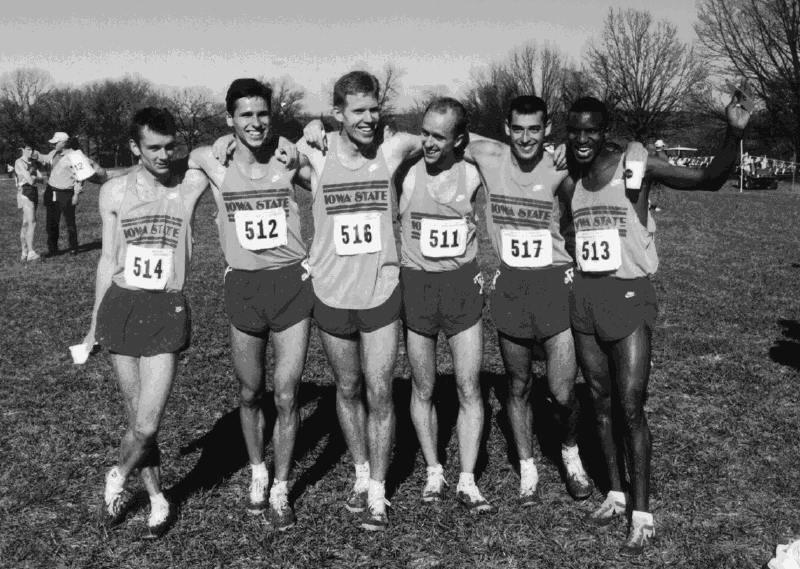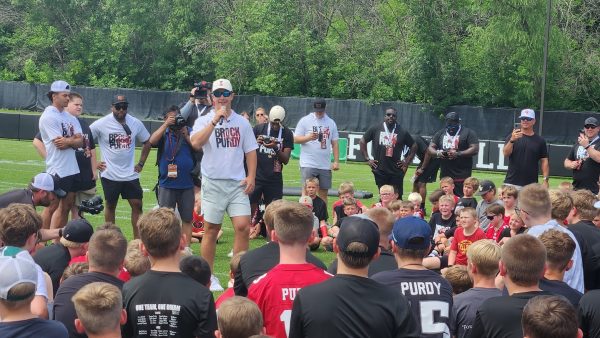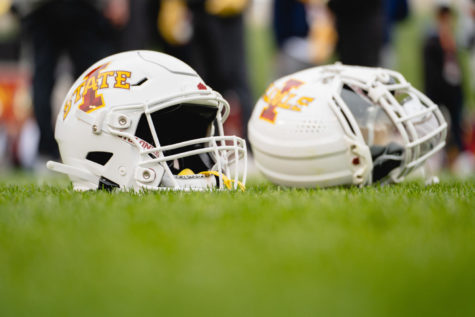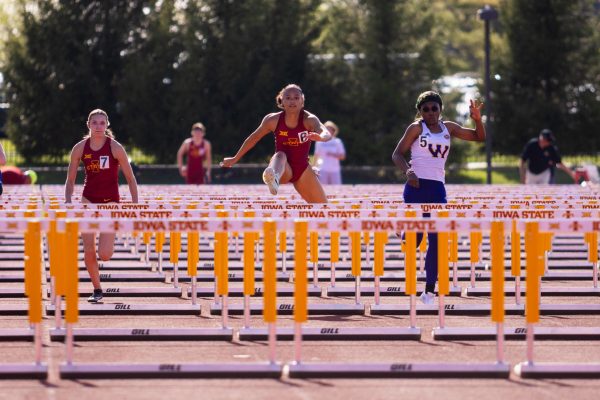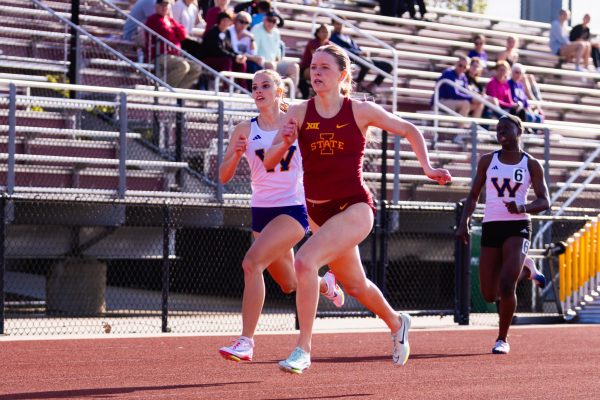The last leg: Bill Bergan, Corey Ihmels reflect upon ISU’s last national cross-country title
The 1994 ISU men’s cross-country team. From left: Steve Brooks, Dmitry Drozdov, Corey Ihmels, Ian Robinson, Jonathan Estabrook and John Kihonge.
November 16, 2012
Undefeated and ranked second nationally, the ISU women’s cross-country team might do on Saturday what the school hasn’t done in 18 years: win a national championship.
It has been more than a decade since five men from four different nations claimed Iowa State’s last national championship; more than a decade since Nov. 21, 1994, when the ISU men’s cross-country team reached the pinnacle of the collegiate cross-country world.
The team had won its first national championship four years prior in 1989, but then suffered through four years of disappointment at nationals. During those four years, the team finished second twice and third once.
Ian Robinson, Dmitry Drozdov, Steve Brooks, John Kihonge and Corey Ihmels were the men who led the team in 1994. Robinson and Brooks had come from Britain, Drozdov from Russia and Kihonge from Kenya, with Ihmels the lone American of the five.
They were led by coach Bill Bergan.
“It’s hard to believe it’s been that long ago,” Bergan said. “That doesn’t seem possible.”
The 1994 season would prove to be Bergan’s second-to-last as coach of the cross-country team. A 2001 ISU Athletic Hall of Fame inductee, Bergan retired in 1995 after a successful 23-year career that included a combined 25 conference titles in cross-country and track.
“I always looked all over for the best athletes and the ones I thought would fit in the program, and from talking to them I really [liked] all of them,” Bergan said of his ’94 team.
Bergan described Robinson, who was a senior and the team’s top runner, as an athlete who wasn’t the most talented and was troubled by injuries. But Bergan said Robinson was a “workaholic.”
The Russian Drozdov was a talented athlete in Bergan’s eyes. Bergan had sent recruitment letters to roughly eight world-ranked junior athletes, but Drozdov was the only one to respond.
“[Drozdov] told me once he got here, yeah, all the others, they got the letter, too, and just thought, oh, this can’t be, and [Drozdov] said: ‘I said to myself, yes, this can be true,'” Bergan said. “So he immediately wrote me back, and the next day he registered for English classes, because he didn’t know a word of English and had to have someone read that letter to him.”
Bergan described Kihonge as an “outstanding student” and Brooks as a hard worker as well as a good cross-country runner — “better in cross-country than he was on the track.”
And then there is Ihmels.
Ihmels is currently the men’s and women’s track and cross-country coach at Iowa State. When he was recruited by Bergan in 1991, Ihmels was coming off of winning the individual National High School Cross-Country championship.
“For lack of a better way to say it, I pretty much had my pick of litter,” Ihmels said of choosing what college he wanted to run for.
Ihmels narrowed his options down to two schools: Iowa State and Oregon. Ultimately, Bergan won Ihmels over.
“Coach Bergan, he came to my house three times; he recruited me pretty heavily,” Ihmels said. “He’s just kind of a down-to-earth guy that is very genuine and honest and obviously he had a lot of success and [was] someone you knew was going to look out for you and take care of you.”
One promise Bergan made to Ihmels was that if he came to Iowa State, the team would win a national championship.
“He kept his promise, so that was pretty cool,” Ihmels said.
Promising a national championship wasn’t something Bergan did often and Ihmels made it happen believing what he said.
“I just felt with the guys we had recruited and with our returnees, and if he stepped in the lineup, too, I was totally convinced,” Bergan said. “It wasn’t just a made-up deal; I was 1,000-percent committed to it.”
The national championship race took place in Fayetteville, Ark., on the home course of the Arkansas Razorbacks. The Razorback men’s cross-country team was looking for a fifth consecutive national championship in 1994.
“There was definitely a rivalry there,” Ihmels said.
Ihmels described the team’s demeanor before the race as “business-like” being both loose and focused.
As the race began, Robinson — who had a series of calf muscle strains in his past — felt what he described as a slight pop in his calf. But since it was his last race, however, Robinson ran on with his muscle loosening up halfway through the race.
Unfortunately, the injury knocked Robinson out of contention for the individual title, which he, Bergan and Ihmels all believed he could have won.
Ultimately, the team would beat second-place Colorado by 23 points.
Robinson finished ninth, Drozdov 12th, Ihmels 13th, Brooks 17th and Kihonge, who fell at the two-and-a-half-mile mark, 22nd.
“It means a lot when I look back,” Robinson said. “You have the friendships, and those friendships never really die; it gives you a sense of pride, a sense of honor.”

